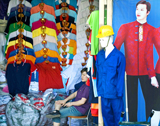China’s exports plunged 22.6 percent last month from a year ago, the sixth straight monthly decline, the government said yesterday, while a torrent in bank lending meant to boost the economy lifted spending on factories and other fixed assets.
Last month’s decline in exports, to US$91.9 billion, is bigger than March’s 17 percent drop and suggests China’s trade sector has yet to see much relief from the prolonged drought in demand brought on by the global downturn.
But there were some glimmers of positive news even in the trade figures. While exports of heavy machinery and other industrial equipment continue to fall, recent increases from the previous month in exports of clothing, shoes, plastics and other labor-intensive consumer goods suggest some recovery in demand, economists say.

PHOTO: AP
US retailers have begun ordering to restock low inventories, amid signs that consumer spending may be stabilizing, Jing Ulrich (李晶), chairwoman for China equities at J.P.Morgan said in a note.
“Nevertheless, operating conditions for Chinese exporters will remain challenging for some time,” Ulrich said, noting that orders at the recent spring trade show in Guangdong fell 17 percent compared with the autumn show.
Demand for imports remains weak. Imports fell 23 percent to US$78.8 billion, the Customs Administration reported, putting the trade surplus for last month at US$13.1 billion. That compared with an US$18.6 billion surplus in March.
Meanwhile, China’s investments in factories and property development jumped 30.5 percent from a year earlier in the first four months of the year to 3.71 trillion yuan (US$543.2 billion), thanks to a slew of bank loans for government stimulus projects. The growth rate was 1.9 percentage points higher than in the first quarter, the National Statistics Bureau said.
China’s banks issued about 5.2 trillion yuan in new loans in January-April of this year, heeding government orders to finance infrastructure projects aimed at boosting employment and stimulating demand.
The surge in investment reflects that trend.
However, a two-thirds drop in new lending last month compared with March, to 591.8 billion yuan, suggests that spending may moderate in coming months as the economy absorbs the huge inflows.
Investment in the private sector remains relatively weak, economists say, and concern is mounting over potential risks of bad debt and waste from excess investment in factory capacity and other projects.
Still, given the protracted weakness in overseas demand for China’s exports, the spending is seen as necessary for a recovery.
“Although much of the new bank lending has not yet turned into faster growth in economic activity, because of the time lag between lending and actual demand, we do expect fixed investment to accelerate in the coming months,” Tao Wang (王濤), an economist with UBS, said in a report on Monday.
“As a result, we expect orders to rise and industrial production to rebound,” she said.

MORE VISITORS: The Tourism Administration said that it is seeing positive prospects in its efforts to expand the tourism market in North America and Europe Taiwan has been ranked as the cheapest place in the world to travel to this year, based on a list recommended by NerdWallet. The San Francisco-based personal finance company said that Taiwan topped the list of 16 nations it chose for budget travelers because US tourists do not need visas and travelers can easily have a good meal for less than US$10. A bus ride in Taipei costs just under US$0.50, while subway rides start at US$0.60, the firm said, adding that public transportation in Taiwan is easy to navigate. The firm also called Taiwan a “food lover’s paradise,” citing inexpensive breakfast stalls

TRADE: A mandatory declaration of origin for manufactured goods bound for the US is to take effect on May 7 to block China from exploiting Taiwan’s trade channels All products manufactured in Taiwan and exported to the US must include a signed declaration of origin starting on May 7, the Bureau of Foreign Trade announced yesterday. US President Donald Trump on April 2 imposed a 32 percent tariff on imports from Taiwan, but one week later announced a 90-day pause on its implementation. However, a universal 10 percent tariff was immediately applied to most imports from around the world. On April 12, the Trump administration further exempted computers, smartphones and semiconductors from the new tariffs. In response, President William Lai’s (賴清德) administration has introduced a series of countermeasures to support affected

CROSS-STRAIT: The vast majority of Taiwanese support maintaining the ‘status quo,’ while concern is rising about Beijing’s influence operations More than eight out of 10 Taiwanese reject Beijing’s “one country, two systems” framework for cross-strait relations, according to a survey released by the Mainland Affairs Council (MAC) on Thursday. The MAC’s latest quarterly survey found that 84.4 percent of respondents opposed Beijing’s “one country, two systems” formula for handling cross-strait relations — a figure consistent with past polling. Over the past three years, opposition to the framework has remained high, ranging from a low of 83.6 percent in April 2023 to a peak of 89.6 percent in April last year. In the most recent poll, 82.5 percent also rejected China’s

PLUGGING HOLES: The amendments would bring the legislation in line with systems found in other countries such as Japan and the US, Legislator Chen Kuan-ting said Democratic Progressive Party (DPP) Legislator Chen Kuan-ting (陳冠廷) has proposed amending national security legislation amid a spate of espionage cases. Potential gaps in security vetting procedures for personnel with access to sensitive information prompted him to propose the amendments, which would introduce changes to Article 14 of the Classified National Security Information Protection Act (國家機密保護法), Chen said yesterday. The proposal, which aims to enhance interagency vetting procedures and reduce the risk of classified information leaks, would establish a comprehensive security clearance system in Taiwan, he said. The amendment would require character and loyalty checks for civil servants and intelligence personnel prior to